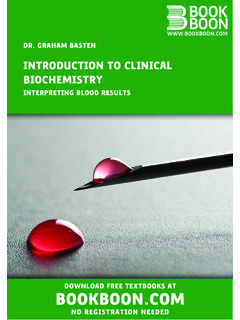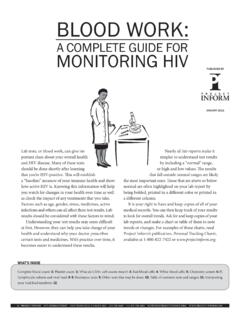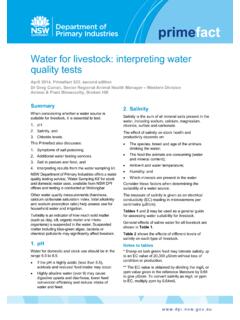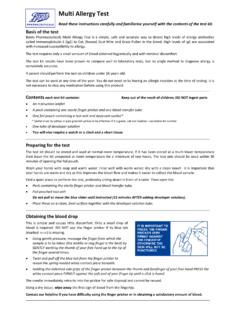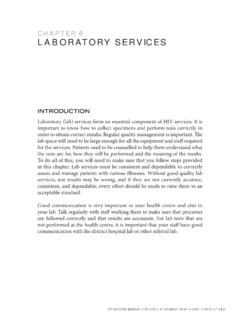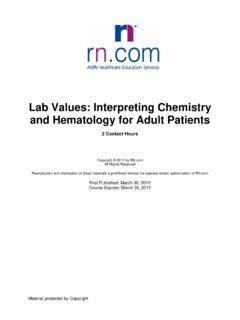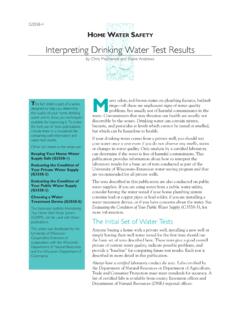Transcription of INTERPRETING YOUR BLOOD TESTS (and more) …
1 INTERPRETING your BLOOD TESTS (and more) Christopher L. Bowlus, MD University of California Davis April 30, 2011 TEST What does it mean? When should I worry? How often should I have it? Liver Panel (Liver Function TESTS or LFTs) A liver panel is a number of TESTS that measure markers of liver injury and to a small degree liver function . See individual TESTS . Every 3-6 months if your disease is stable. More frequently if PSC is advanced or rapidly changing. Alkaline Phosphatase (ALP) Increases when there is injury to the bile ducts or obstruction of bile flow. ALP fluctuates a lot in PSC and does not measure how the liver is doing or how advanced the disease is. Some PSC patients have normal ALP.
2 However, a rapid and persistent increase in ALP should trigger further investigation with an MRC and/or ERC. Alanine Aminotransferase (ALT, sometimes called SGPT) Increases when there is injury to the hepatocytes (main liver cell). ALT is usually not as elevated as the ALP in PSC. If it is greater than the ALP, then autoimmune hepatitis should be considered. Aspartate Aminotransferase (AST, sometimes called SGOT) Like the ALT but less specific to the liver. Bilirubin A true measure of part of the liver s functions. Can increase with obstruction of the bile ducts or indicate cirrhosis. Total bilirubin should be less than mg/dL but sometimes is chronically elevated in PSC.
3 Increases in bilirubin should be evaluated with an MRC and/or ERC. Gamma-Glutamyl Transferase (GGT) Very non-specific test that is of minor importance. Usually elevated in PSC. Albumin Often included in a liver panel, albumin is the major protein found in the BLOOD . It is made in the liver and can be decreased if the liver is not functioning normally. However, it can also be low due to malnutrition, infection, and many other causes. Albumin should normally be greater than g/dL. Total Protein This is the total amount of protein in the BLOOD , including albumin. TEST What does it mean? When should I worry? How often should I have it? Complete BLOOD Count (CBC) Measure all the types of cells in the BLOOD including the white BLOOD cells, red BLOOD cells, and platelets.
4 Every 3-6 months if your disease is stable. More frequently if PSC is advanced or rapidly changing. White BLOOD cell count (WBC) White BLOOD cells are the cells that fight off infections. There are many different types that have different functions and are usually listed as neutrophils, lymphocytes, monocytes, eosinophils, and basophils. An elevated WBC is an indicator of infection or inflammation. An increase in the WBC along with pain over the liver and fever may indicate cholangitis (infection in the bile ducts). The WBC is sometimes chronically elevated in PSC, especially when there is chronic cholangitis. Red BLOOD Cell Count (RBC), Hemoglobin (HGB), Hematocrit (HCT) Red BLOOD cells are the cells that carry oxygen in the BLOOD .
5 The RBC, HGB, and HCT are all measures of the red BLOOD cells. Anemia is the condition when these measures are low. Anemia can be caused be many conditions associated with PSC, especially when there is also inflammatory bowel disease (IBD). BLOOD loss from bleeding in the intestinal tract, iron deficiency due to bleeding, IBD or celiac disease should be considered. MCV, MCH, MCHC, RDW Measure features of the red BLOOD cells that can help determine the cause of anemia. Only if you have anemia. Platelet count (PLT) Platelets are the components in the BLOOD that help form clots. Platelets are increased when there is inflammation in PSC. Platelets are decreased when PSC progresses to cirrhosis.
6 This can be the first sign of cirrhosis and is due to platelets getting trapped in the spleen, which is usually enlarged at this time. TEST What does it mean? When should I worry? How often should I have it? Chemistry Panel Every 3-6 months if your disease is stable. More frequently if PSC is advanced or rapidly changing. Sodium The concentration of sodium in the BLOOD . Can be decreased in cirrhosis or with the use of diuretics. Potassium The concentration of potassium in the BLOOD . Can be increased or decreased with diuretics or if the kidneys are not functioning. Glucose The measure of the BLOOD sugar Elevated levels (greater than 120 mg/dL) while fasting may indicate diabetes.
7 Creatinine This is a measure of kidney function but is dependent upon several factors including muscle mass. The eGFR is a calculation that takes these factors into consideration. This is usually less mg/dL. PSC does not typically affect kidney function until there is cirrhosis. INR Measures proteins in the BLOOD that are made in the liver and are involved in the clotting of BLOOD . Similar to albumin but less affected by diet and inflammation. Normal is or less. Every 3-6 months if your disease is stable. More frequently if PSC is advanced or rapidly changing. Model of End-Stage Liver Disease (MELD) The MELD score is a calculation based upon the creatinine, bilirubin, and INR that is used to predict the prognosis of all patients with liver disease.
8 The minimum score is 7. To calculate your score, you can enter your labs at this website: The minimum MELD score for liver transplantation is 15. TEST What does it mean? When should I worry? How often should I have it? Cancer Screening TESTS CA19-9 A cancer marker that may be elevated in cholangiocarcinoma and other cancers. Can also be high with bile duct obstruction. CA19-9 can be increased in PSC with cholangiocarcinoma, but an elevated or rising level should be investigated with MRC and/or ERC. Every 6-12 months or more frequently if there is a concern about cholangiocarcinoma. CEA A cancer marker that is less specific than CA19-9 but may help in screening for cholangiocarcinoma.
9 Every 6-12 months or more frequently if there is a concern about cholangiocarcinoma. Alpha Feto-Protein (AFP) A cancer marker used to screen for hepatocellular carcinoma. This cancer is less frequent than cholangiocarcinoma in PSC unless there is cirrhosis. Every 6 months if there is cirrhosis. Colonoscopy Not a BLOOD test but should be done annually if you have IBD and PSC due to the increased risk of colon cancer. When dysplasia is found on a biopsy, you may need to have your colon removed. Every year if you have IBD and PSC. Miscellaneous TESTS Vitamins Vitamins A, D, E, and K require bile for absorption. They can be low in some PSC patients. Levels for A, D, and E can be measured.
10 A low vitamin K will cause an increase in the INR. Supplements should be given if levels are low. Annually or more frequently if deficient. DEXA (Bone density scan) Decreased bone density is classified as osteopenia and osteoporosis, which increases the risk of fractures. PSC patients are at increased risk of these conditions. At diagnosis and then every 1-2 years in most cases. This information is intended strictly for general guidance and not for specific situations. Please discuss you individual case with your physician.
